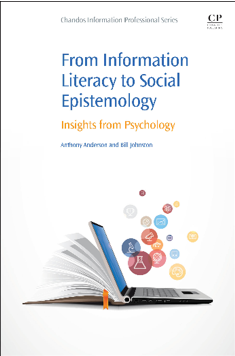Publication Details
| OLOR Series: | ROLE Reviews |
| Author(s): | Michelle A. Payton |
| Original Publication Date: | 15 July 2018 |
| Permalink: |
<gsole.org/olor/rolereviews/2018vol1no2.rev5> |
Publication Note
This review was originally published in Research in Online Literacy, vol. 1, no. 2 (2018).
Resource Overview
Media, Figures, Tables |
Resource Contents
Review of From Information Literacy to Social Epistemology
The Digital Age has resulted in a body of information that can accurately and inaccurately serve those in education and the workplace; therefore, consistent, effective instruction must be put in place to help students maneuver through murky information waters. From Information Literacy to Social Epistemology: Insights from Psychology is thick with studies and theories in psychology, pedagogy, and information literacy in higher education that provides a widened perspective on learning tools to aid information literacy scholars and practitioners. Anderson and Johnston are interested in filling a gap in the design of information literacy teaching by tapping into their strong knowledge-base in psychology, research in peer learning, thinking skills, lifelong learning, and background in the library profession. Ultimately, they argue that theories from psychology should be a part of the conversation as library professionals, academic lecturers, institutional leaders, and professionals committed to the information literacy field develop theoretically sound and pedagogically effective ways to help individuals learn information literacy concepts and techniques. Many influential organizations in the field of information literacy are referenced, so skilled professionals and institutional leaders linked to those organizations, as well as those informed in psychological components, would get the most out of this text.
In this book, multiple subjects in information literacy education are explored. First, looking through students’ eyes, research from multiple sources described adults returning to formal academic studies and their weaknesses in information literacy processes. Student weaknesses included: students making incorrect presumptions on reliable online information, high uncertainty on how to judge good quality information, and a lack of literate peers. This learning triggered additional questions on the role of psychology with emphasis on critical thinking, how this connected to pedagogy, and epistemological stages of thinking and metacognition—the ability to regulate mental processing. Strong evidence now shows that epistemological thinking is relevant to information literacy education due to peer teaching and learning, which creates higher student performance.
Additional subjects broached were school and adult teaching and learning approaches, such as constructivism where instead of feeding students information for immediate retention, learners construct their own knowledge, which unfolds over time. The key points were that learners have intuitive knowledge prior to being instructed; as a result, teachers must facilitate and interact with the objective of coaxing learners to embrace the conflict that comes with letting go of old belief systems and adopting new experiences.
In terms of skilled, institutional leadership, curriculum development and redesigning teaching practices were suggested using the New Curriculum Framework from the U.K.; however, details on the original research report and how UK institutions applied this curriculum to teaching practices require referencing sources outside of this text. In addition, the summary of The Association of College and Research Libraries (ACRL) framework and pedagogical change in the U.S. over a 14-year timeframe needs a trained eye to understand why the ACRL “list of trends seems to lack any underlying analysis or theoretical explanation to lend coherence and focus, e.g., an account rooted in social constructivism to clarify where the selected trends are coming from” (p. 106). An even wider leadership net was cast when touching on the UNESCO contributions to information literacy. While many UNESCO studies were cited, the authors point out the significant limitations of not including psychological insight. Overall, they made a strong argument that the contributions of UNESCO, ACRL, and the New Curriculum Framework are a part of the information literacy education story; however, the psychology component, that includes critical thinking, epistemological thinking and metacognition, is also an essential piece to be added to the discussion.
From Information Literacy to Social Epistemology: Insights from Psychology strengths are that it is a highly informative read that addresses influential organizations in the field of information literacy and includes strong arguments that add psychological components to develop more theoretically and pedagogically effective ways to help individuals understand information literacy concepts and techniques. Anderson and Johnston end with “We offer this proposal in the spirit of critical friendship, and look forward to colleagues joining the debate with us” (152). If this is their main objective, the substantial subject-matter spanning across disciplines, countries, and regulatory bodies should coax more dialogue from other critical friends.
About the Reviewer
Michelle A. Payton is a community college instructor in Asheville, North Carolina. She teaches Developmental Reading and English, Academic Success for Transfer Students, and English Composition. She has held communication positions as an advertising copywriter, a consumer and technical publications writer, and a brand marketer. Michelle has also published numerous books independently.



